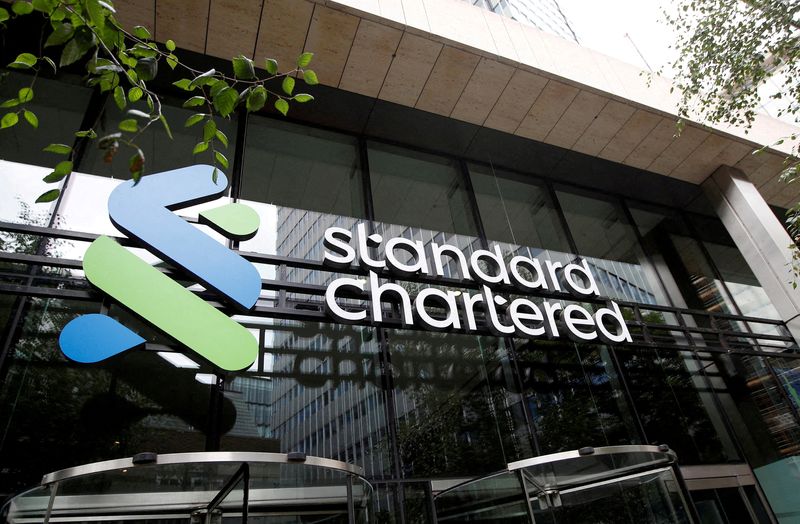Gold prices set for weekly gains on dovish Fed outlook; silver near record high
By Lawrence White and Selena Li
LONDON/HONG KONG (Reuters) -Standard Chartered PLC beat forecasts on Thursday with a 5.5% rise in first-quarter pretax profit, as a surge in income from its trading and wealth businesses more than compensated for additional credit losses.
The bank, which makes the bulk of its revenue and profits in Asia, saw profit at its investment banking unit climb 13% in the quarter.
Crucially, the bank grew fee-based revenues as it raked in more wealthy clients and saw robust trading activity across its markets product set, a key target for it and rivals such as HSBC (LON:HSBA).
Peaking central bank interest rates worldwide have capped the recent gains banks have made from lending-based income, putting pressure on them to increase non-interest revenue from such fee-based businesses.
StanChart's shares, a focus for CEO Bill Winters, jumped more than 6% in London by 0720 GMT, matching earlier gains in Hong Kong.
"After some years in the doldrums having been the darling of the UK banking sector, Standard finds itself in something of a revival," said Richard Hunter, Head of Markets at interactive investor.
"Although a potential takeover by First Abu Dhabi Bank previously came to nothing, such bid speculation remains close to the surface," he said.
StanChart, which has been the subject of repeated takeover speculation in the last decade, saw renewed interest last year after First Abu Dhabi Bank said it had considered but abandoned a bid. The London-headquartered bank has since said it has had 'no contact' with the Middle East-based lender, but sources have told Reuters another attempt should not be ruled out.
The strong performance across its business lines while keeping costs under control should help StanChart shares burst out of their longstanding malaise, Joe Dickerson, analyst at Jefferies in London, said.
StanChart posted a pretax profit of $1.91 billion in the January-March quarter, compared with $1.81 billion a year earlier and the $1.39 billion average of 13 analyst estimates compiled by the bank.
But the lender's credit impairments worsened in 2024, with a $165 million writedown in the first three months, compared to $20 million a year earlier.
The bulk of the credit impairment was accounted for by the bank's wealth and retail banking division, as the unit was hit by "mortgage headwinds" in Hong Kong and South Korea, StanChart said.
The British bank has made provisions worth $1.2 billion in total for the China commercial real estate sector, it said. Its total credit exposure to the sector was now at $2.4 billion, down $200 million from the preceding quarter.
StanChart had taken a total of $850 million in writedowns in the previous quarters on its stake in China's Bohai Bank, which like its peers suffered from a slowing Chinese economy and the deepening crisis in the property sector.
Chinese authorities have been ramping up measures over the last few months to prop up the troubled sector, but analysts say many of the policies are piecemeal in nature or have only limited, short-term impact.
StanChart said that it remained cautious on the sector as residential sales volumes continue to decline this year.
KOREA PROVISIONS
StanChart also said it booked a $100 million provision for expected compensation fees for customers in South Korea who bought certain equity linked securities which ended up causing them a loss.
Regulators in the country have advised that banks in the country who sold such products should reimburse customers.
StanChart's results come just days after its bigger, crosstown rival HSBC, which also makes the bulk of its profits in Asia, announced the stepping down of its CEO Noel Quinn and quarterly profit that was slightly ahead of forecasts.
StanChart's Winters has held the top job since 2015 and is one of the longest-serving chief executives in UK banking.
In March, the bank unveiled a management reshuffle that saw the departure of its corporate and investment banking head, Simon Cooper, who had been seen by some investors as a potential successor to Winters.
"We have taken action to create a simpler and more efficient organisation with changes to our group management structure," Winters said.
